|
The local newspaper recently published an article stating that an "iPad Users Group for Teachers" formed in Falmouth, MA. The educators meet monthly to review apps that would benefit their students. Kudos to these educators for broadening their teacher tool kit, motivating their students by incorporating technology into their lessons, and for extending their school day in order to become become more knowledgeable professionals.
1 Comment
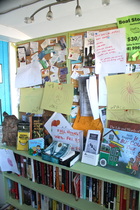 On a road trip, we stopped to eat at the Bayside Restaurant in Westport, MA. and I was thrilled to see this literacy area for children. Many restaurants provide crayons and a pre-drawn image for little ones, but the Bayside offered children the opportunity to draw freely, illustrate and caption a picture, a place to post creations, and a wonderful choice of books to read. Maybe this idea will catch on. Spread the word!  Our followers might enjoy listening to any of the eight 30-minute segments which may be downloaded on the NPR Humankind series: Educating the Whole Child at http://www.humanmedia.org/catalog/program.php?cPath=73&products_id=139 Some highlights include character development, celebrating heroes, the importance of folklore, diversity, and the value of education. 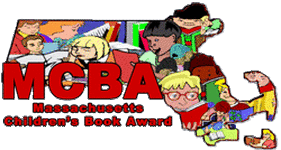 For great read alouds or independent reading books for 4th-6th grade readers, visit the Mass Children's Book Awards page at Salem State College. There is even a grade level guide. We have read most books and agree that these are highly motivating and well-written books. Click here for the link and enjoy: https://www.salemstate.edu/academics/schools/3698.php 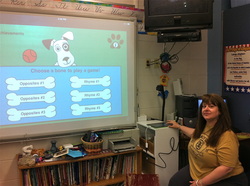 Holly, an elementary school teacher, connects her iPad to SMART Board in the classroom and projects FunDog onto the large screen. Reading groups come up close with individual white boards and markers. Different students read the analogies, and each student records the sight word that they think is missing. Discussion follows. Holly says that this is a hit with her students. Has anyone else tried using apps with students? Tell us about your experiences. This is your new blog post. Click here and start typing, or drag in elements from the top bar.
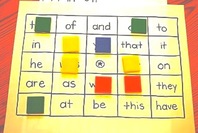 There are many ways to teach children sight words, those words making up most of the words on a printed page. Repetition and engagement are key, therefore, we encourage children to play the FunDog app multiple times. Parents can play other sight word games at home with their children. Print up some BINGO cards using sight words, or Google a site that will create word searches. Make a duplicate set of sight word cards and play concentration. Notice sight words in magazines, on menus, or in recipes. When children enjoy the experience, they will want to do it again, so keep the practice fun. 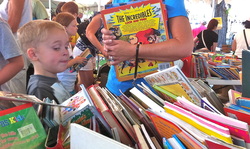 The public library summer book sale is enjoyable for the whole family. Parents can browse through a multitude of genres, and kids get to select books which they would like to read. On the last day of the sale, a brown shopping bag of books costs $1. What a deal! Then, those books can be re-donated back to the library. I love the expression on this little guy. It’s so important for all children to read during the summer to prevent what is known as the “summer slide”. From September through June, school children read in school and often as part of their homework. They learn about new authors, different genres, and about strategies and skills will help them become better readers. Without this daily opportunity in June and July, some children lose ground and have difficulty reading when school resumes.
What can you do? Talk about the school’s summer reading list with your child and what books might be interesting to read. Get input from your child’s teacher or you local librarian. Sign up for one of the summer reading programs in your area. Usually bookstores and libraries have a summer-themed reading program that offers special activities including a final celebration. Remember that children love being read to, so sit down and read a book or magazine together and talk about your connections, predictions, questions, or what you learned. Play board games or app games that promote practice. Take trips to zoos, museums, parks, beaches, or local events. These experiences will build memories, personal relationships, and vocabulary. After the trip ask your child to write about the highlights. Along with some digital photos, your child will be proud of the summer journal or online family blog! Summer is a time to sit back, relax, and enjoy vacation. It is also the perfect time for your child to discover the joys and benefits of daily reading. I just saw a posting from a teacher friend who buys many classroom library books at yard sales. Accompanied by her daughter, Heather selects books with themes of her grade's curriculum plus those that vary in readability (easy to challenging text). Even in the older grades, students still like reading favorite picture books. For as little as a dime or a quarter, parents can build a home library for their children.
|
AuthorsKathleen and Brenda are Reading Specialists who love teaching literacy skills and strategies. Archives
February 2013
Categories
All
|

 RSS Feed
RSS Feed
